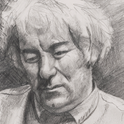Stuart Hall's adult life encompasses the history of modern black settlement in Britain. He was born 64 years ago in Kingston, Jamaica, and when he arrived at Bristol dock by steamer with his mother in 1951, to enroll as a Rhodes scholar at Merton College, Oxford, mass black immigration into Britain had not even begun.
Unlike most of those who came on such scholarships, Hall never went home. One year off retirement now, afflicted with arthritis and walking with a stick, he has the sober, university common room style that marks out his generation of middle class black Britons from those that came later. Like the Huguenots and the Jews before them, his generation did us the favour of becoming like us. That meant not talking in loud voices about points of difference, adopting a tweedy sort of costume and a gentle, self-deprecating way of speaking.
Hall appears to have followed this formula to a tee. His manner is understated. He is soft-spoken, funny and charming. The oratory for which he is famous is all the more effective for being couched in a gentle delivery, still slightly inflected with the Jamaican accent.
And he has reaped the rewards. Twenty-three pages of curriculum vitae come snaking out of the fax machine. Hall is a DLitt Hum ten times over, as well as a fellow (Portsmouth Polytechnic) and Centenary fellow (Thames Polytechnic) -a compensation for the fact that he never finished his doctoral thesis on "Europe vs. America: Cultural and Moral Themes in the 'International' Novels of Henry James."
More pages are devoted to his lectures, articles in learned and not-so-learned journals, textbooks and television programmes. Oddly, he has only one book to his credit, and that a collection of essays, but a volume honouring his life's work, Stuart Hall: Critical Dialogues in Cultural Studies, was published earlier in the year. Hall, laden with honours, seems a living testimony to the doctrine of assimilation.
Not quite. His life's work, after all, has been an unending argument with Englishness and its assumptions. In the course of it, he has been midwife to the New Left, conduit into British academic thought for a succession of continental thinkers (Althusser and Foucault), the godfather of cultural studies, and the inventor of the word "Thatcherism." Generations of leftist high-flyers have been fired by his passions.
Yet despite all the achievements, history shows signs of delivering a harsh verdict on Hall. His volume of essays, The Hard Road to Renewal (Verso, 1988), received harsh reviews: "God help his undergraduates and God help the left," wrote Terry Coleman in the Guardian. "Hall is too often a victim of the tortuous prose that is the worst legacy of cultural studies," wrote Ben Rogers in the Independent on Sunday of Critical Dialogues.
Here is a sample from the first issue of Soundings, which Hall and friends launched last autumn: "Can one show that there is such a thing as 'society,' though it is not the closed totality, the sutured closure conceived of by state socialism... but remains fundamentally open to the contingency of historical movement and change-a place of calculation and strategic operations, not an ultimately predictable social essence." This is part of Hall's attempt to define the "grand idea" for the left.
Hall's argument with England started in the family home in Kingston. It was an upwardly mobile family, but one riven with class and racial tensions: his mother's family was much fairer in complexion than his father's, and more genteel. His father wanted him to join the sports clubs he belonged to, but, as Hall said in an interview in Critical Dialogues: "I always thought that he himself did not quite fit in this world... He was accepted on sufferance by the English. I could see the way they patronised him. I hated that more than anything else." His mother identified with "the mother country" and practically thought of herself as English. But her clever son Stuart was the darkest-skinned member of the family; his much fairer sister called him "the little coolie."
Hall reacted to this cocktail of urges and prejudices by becoming a radical anti-imperialist. When he was 17, his sister had a breakdown after her parents forced her to break off a relationship with a medical student who, though middle class, was too dark for them. This event, Hall says, "broke down forever, for me, the distinction between the public and the private self." It persuaded Hall that he had to escape. His destination, Oxford, was the best his mother could have conceived for him-"she delivered me, signed and sealed, to where she thought a son of hers had always belonged," he says. But he arrived in an argumentative mood. He came to study English literature in the Leavisite mode but quickly fell in with other radical spirits, notably Raymond Williams. When Russia invaded Hungary in 1956 and the university Communist party branch (Hall himself had never been a member) collapsed, the New Left was born, and Hall found himself at the heart of it.
This was the first of several occasions on which he has been involved in key moments in the evolution of the British left: Hall co-editing The Universities and Left Review; Hall bringing the two great writers of the New Left, Richard Hoggart and Raymond Williams, face to face for the first time; Hall becoming founding editor of New Left Review. Given his meagre written output (com-pared to Hoggart and Williams), there is something surprising about this centrality. One has the suspicion that part of Hall's value to the movement may have been totemic.
Certainly he himself remembers feeling a certain detachment from the hubbub of activity. "I have a funny relationship to the British working class movement... I'm in it, but not culturally of it... I was aware that I'd come from the periphery of this process. I was reluctant to go canvassing for the Labour party. I don't find it easy to say, straight, face to face with an English working class family: 'Are you going to vote for us?'"
Hall's next important contribution was the transformation of cultural studies into a serious academic project. Richard Hoggart, by 1964 professor of English at Birmingham University, persuaded the publisher Allen Lane to finance the launch of a centre for cultural studies in Birmingham, and Hall, whose interests had spread to include television, film and popular literature, came to run it. He stayed there for 15 years.
Cultural studies reached out to examine the sort of popular culture disdained by the Leavisites from whose ranks Hall had come. It took sustenance from a wide range of French thinkers who had largely been ignored in Britain. But its unforgivable sin is the pompous, ugly, jargon-encrusted prose in which its texts are written.
Hall and his acolytes wrap whatever they are dealing with-black music, film, dance-in a shroud woven of dense, polysyllabic Franglish. This is the way that fallen Frankfurt school Marxists persuade themselves that they are doing something important; as important as geneticists or physicists.
Hall concedes that "a lot of crap goes on in media studies, like in almost everything." Admirers such as Martin Jacques, the former editor of Marxism Today, say: "The content of what he says is very dense-he stretches you; that's one of the reasons he's been so influential." But the turgidness that characterises cultural studies is in the heart of Hall's work, too. It is a paradox that the study of popular culture should be incomprehensible to all but a small, learned elite.
Hall eventually left Birmingham under pressure from anti-patriarchal feminists, moving to the sociology department of the Open University. Throughout his career, Hall has been a compulsive non-joiner. He never joined the Communist party, and was only briefly signed up to Labour. He flirted with a number of French thinkers, but was never submerged in any of them. "I've never been a disciple of any school," he says. "I've lived too long. I've seen all the schools, I've seen people say, I'm sorry, Althusser was wrong after all. You can only do that about three times in your life; after that, you begin to feel like a fool! You must have the modesty of saying, this is a bloody good idea but I probably won't believe it in five years' time..."
Hall's agility meant that in the late 1970s he still had something to contribute to British leftism. The sad thing is that that something was the left's epitaph: the word "Thatcherism." Early in 1979 he wrote a famous article in Marxism Today called "The Great Moving Right Show," in which the word Thatcherism was used for the first time. Hall saw different strands coming together to make what he calls "authoritarian populism," where "the declining, pressured white working class met their competitors, the rising, culturally different black youth." Middle class leftists could remain ignorant of such developments; blacks, however, even middle class and middle aged ones like Hall, could hardly fail to register the change of mood.
Like any thinker wedded in his heart to the ideas of Marx, the last seven years have been a depressing time for Hall. His anti-Stalinist credentials don't make it much better. "I would not have wanted to live in a [communist] society... but their collapse matters in terms of the geopolitical distribution of possibilities... The landscapes of your political imagination have been reduced, truncated, by a move to the right."
As his long spell at the Open University draws to a close, Hall projects a mood of bleak pessimism. His new journal, Soundings, runs at a painfully low intellectual voltage, and socialists will scour it in vain for crumbs of comfort.
Hall is the brainy colonial boy made good in the "mother country," and made good on his own terms. It is sad that the conclusion of such a brilliant career should be a mood of such intellectual demoralisation.
Jeremiah from Jamaica
Stuart Hall has been a central figure on the left for 40 years. The father of cultural studies-with its jargon-encrusted prose-is now in bleak mood
August 19, 1996











